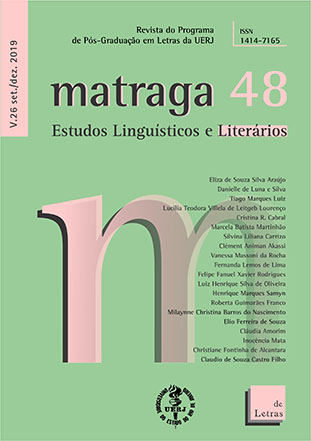Black reason and the romantic project: double face of the novel Úrsula (1859), by Maria Firmina dos Reis
DOI:
https://doi.org/10.12957/matraga.2019.42343Keywords:
Black reason, romanticism, Úrsula, Maria Firmina dos Reis.Abstract
This study intends to analyze the novel Úrsula (1859), by Maria Firmina dos Reis, based on the concept of «black reason» formulated by Achille Mbembe (2014), in contrast to the romantic aesthetic that also supports the author›s book Brazilian. And, in addition, it aims to discuss how this concept of Mbembe helps to understand the representation of the black people realized by Firmina’s text. For Mbembe, «black reason» is linked to the fabrication of images of knowledge and the afro-descendant subject. The hypothesis of this essay is that «black reason» operates as a device responsible for enhancing the understanding of afro-descendant images in the novel Ursula, as exemplified by the trajectories of Túlio, Mãe Susana and Antero. If, on the one hand, the book in question chooses to follow the general lines of Brazilian romanticism, when discussing the configuration of the nation and slavery, on the other hand it does so from the paradigms of identity ruled by “black reason”, the black people as subject of actions and discourse.
Downloads
Downloads
Published
How to Cite
Issue
Section
License
Authorization
Matraga – Scientific Journal of the Post-graduate Program in Arts and Humanities of UERJ is authorized to publish the article submitted here, if it is accepted for online publication. It is attested that the contribution is original, that it is not being submitted to another publisher for publication, and that this statement is the expression of truth.
The works published in Matraga's virtual space – Scientific Journal of the Post-graduate Program in Arts and Humanities of UERJ will be automatically transferred, and your copyright is reserved to Matraga. Its reproduction, in whole or in part, is conditional on the citation of the authors and the data of the publication.

Matraga uses license Creative Commons - Attribution-Non-Commercial 4.0 International.





